Everything You Need To Boost Your Collagen
9 minutes read
Supple skin, less visible wrinkles, healthy hair, and chip-free nails are some of the biggest collagen benefits that make this ingredient so sought after in the beauty world. If you are on a quest to find the fountain of youth and want fantastic skin for your age, working on boosting collagen should be your main priority. Think of collagen like the ‘building blocks’ of the skin – giving your complexion its lustre and bounce. Sadly as we age, our collagen levels deplete but there are ways you can help boost it (and your skin will thank you for it).
Beauty Daily enlisted the help of experts about the five collagen benefits you need to know and expert-approved ways on how you can incorporate this important nutrient: from collagen-boosting skincare products to supplements and nutrition. Plus, guest nutritionist, Eli Brecher, shares her rich collagen recipe, so you can eat your way to beautiful skin! Read on to discover more…
What is collagen?
Collagen is such a trendy buzzword in the skincare and nutrition worlds, prized for its anti-ageing properties. No surprise everyone wants a taste of it, and we are bombarded with all sorts of collagen products from drinks, powders, capsules, and creams. Here’s what you need to know…
Collagen is a naturally occurring structural protein which we all have. It’s found in skin, connective tissue, tendons, bones, blood vessels, and cartilage and makes approximately 30% of the proteins within the body. It helps skin cells adhere to one another and is often called the ‘body’s scaffolding’ as it acts like a glue that holds the body together.
It also gives the skin strength, elasticity and youthfulness (which is why babies have such chubby, cherubic faces!).
Apart from skin health, collagen is also responsible for healthy bones, improving joint health, stronger teeth and nails, and healthier hair.
However, as we age, our existing collagen breaks down, and it gets harder for the body to produce more, cue skin wrinkling, thinning, and sagging while ligaments lose their elasticity, joints get stiff, and much more.

When does collagen decline?
Experts say we begin to lose about 1% of our collagen per year in our mid-20s, however, the early signs of ageing start to become more prominent around the age of 30 – and we lose as much as 30% more collagen during the first five years of menopause.
Reduced collagen levels mean the skin loses its elasticity, which results in more prominent lines and wrinkles, as well as sagging skin.
The good news is you can start ‘collagen banking’ (or collagen boosting) now, so your body will have more of it later.
Read next: Treatment For Wrinkles Above The Lip & How To Rejuvenate Your Mouth
Five collagen benefits you should know
1. It smooths wrinkles and boosts skin elasticity
Collagen plays a significant role in skin health, strengthening skin, as well as keeping it firm and hydrated. Several studies have shown collagen may help slow the ageing of the skin by reducing wrinkles and dryness.
2. Strong Nails
If you suffer from dry and brittle nails, taking collagen might help. Scientific evidence has proven collagen helps healthy nail growth and strengthens brittle nails.
3. Healthy Hair
Experts say collagen plays a role in building keratin (the primary protein in your hair), making hair grow healthier, thicker, and shinier.
4. Improved Joints
Achey joints? Research suggests that increasing your collagen consumption can reduce overall joint pain. Collagen helps maintain the integrity of your cartilage i.e., the rubber-like tissue that protects your joints and allows them to move smoothly against one another.
5. Boost bone health
Our bones are 30% collagen. With our bone cells constantly turning over, collagen supports bone health by increasing bone mineral density. In other words, the denser your bones, the stronger they generally are and the less likely they are to break or be damaged.
How to get more collagen into your routine (skincare and nutrition)
Boost collagen through skincare
Experts agree that skincare formulated with collagen plumps, hydrates, and conditions the skin. However, these products don’t increase our collagen levels. An inside-out approach is key to youthful, radiant skin.
Retinol stimulates fibroblasts to synthesise collagen fibres
We all know retinol as the fountain of youth in skincare. “Retinol is a vitamin A derivative, and it works in a few different ways in the skin. It increases the production of collagen, which results in reducing fine lines and wrinkles; it smooths and even skin’s complexion and improves saggy skin,” Dr Anastasia Therianou MD, PhD, a London-based NHS consultant dermatologist tells Beauty Daily.
Beauty Daily swears by the power of harungana, Madagascar’s traditional medicine super plant which is as effective as retinol in the synthesis of collagen. Discover its plant power in the all-new Super Restorative Range.
Organic Mitracarpus improves the elasticity and firmness of the skin
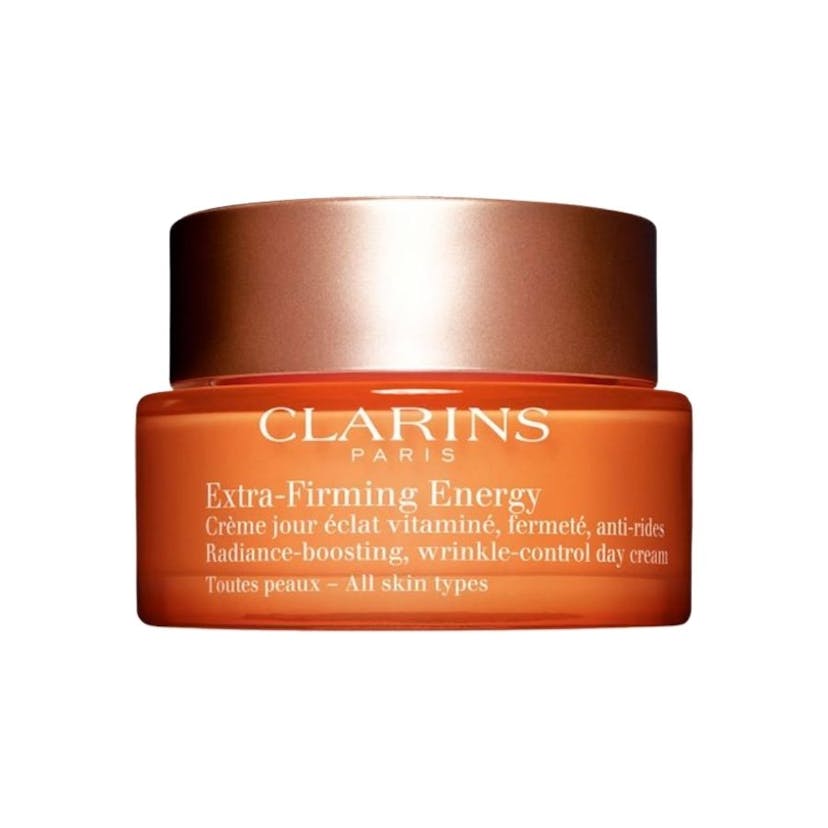
This is a small West African perennial plant, found in the Extra-Firming Range, which visibly improves the elasticity and firmness of the skin. Its organic extract promotes collagen production and strengthens skin firmness’ linkages. The Extra-Firming Energy Day Cream, £61 is perfect for busy and active women in their 40s. It is must-have collagen-boosting cream as it helps restore the skin’s firmness and creates a revitalised, radiant complexion.
Apart from boosting your skin’s collagen, it is powered by the Glow Plus Complex: a concentrate of energising fruit extracts and four next-generation pearlescent pigments that capture the natural light and reflect it on the skin, delivering an instant enhancing effect on all skin tones.
Kangaroo Flower is recognised for its powerful regeneration ability
Kangaroo Flower, which is also a key ingredient in the Extra-Firming Range, helps to battle the appearance of skin slackening and leaves skin appearing plump.
Charlotte McHale, Clarins Training Manager says: “Kangaroo flower extract strengthens the bonds between infant fibroblast cells, which are held together in a ‘nest.’ It also reinforces the nest itself. This helps ensure the cells reach maturity. The more fibroblast cells, the more collagen, elastin, and hyaluronic acid in the skin.”
Explore the Extra-Firming Range.
Collagen supplements
If you are sceptical about taking collagen supplements, don’t be! Research has proven daily ingestion of collagen supplements at an effective dose can lead to some positive collagen benefits.
Healthline reports that collagen supplements have become popular in recent years. Most supplements are hydrolysed, which means the collagen has been broken down to make it easier for the body to absorb. It comes primarily in powder form, but it is also available in capsules.
More research has linked some collagen peptides to reduced skin wrinkles and healthier skin, so it’s possible new findings will explain the anecdotal evidence linking collagen powder to boosted nail and hair growth.
Experts say collagen in the form of collagen peptides and capsules are supplements that can help your body replace its lost collagen.
Here are some collagen supplements worth checking out:
Collagen supplements have a good safety reputation and are not associated with adverse side effects.
Vital Proteins Collagen Peptides, £24.99
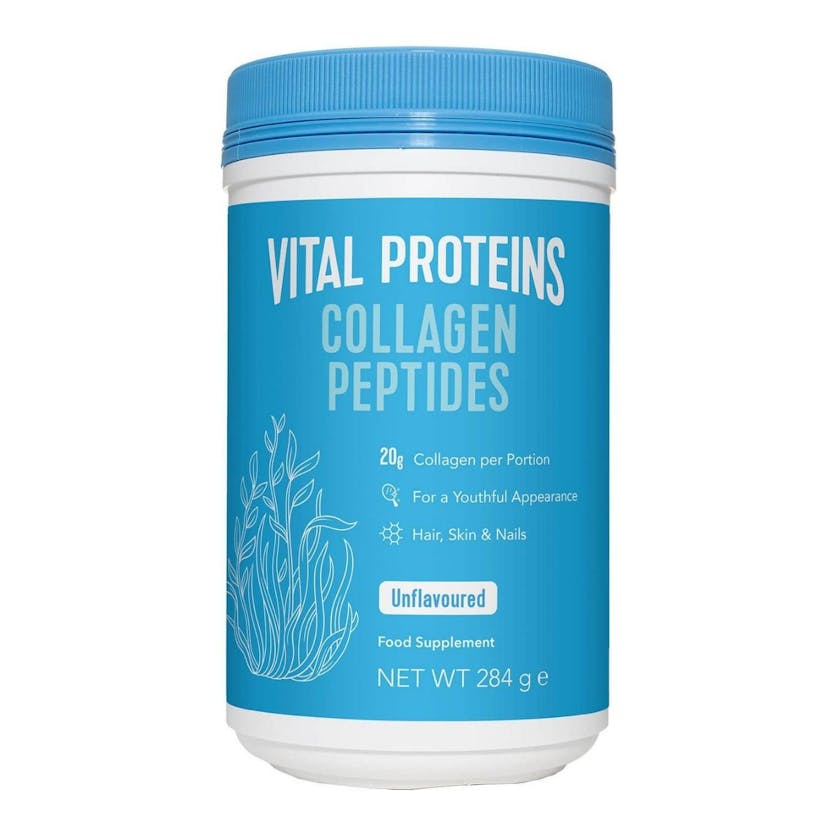
Vital Proteins’ Collagen Peptides are bioavailable, meaning they can be easily digested and absorbed by the body. Simply add a scoop to hot or cold drinks, such as coffees or smoothies.
Beauty Pie Hydrolyzed Marine Collagen Peptides, £31.50
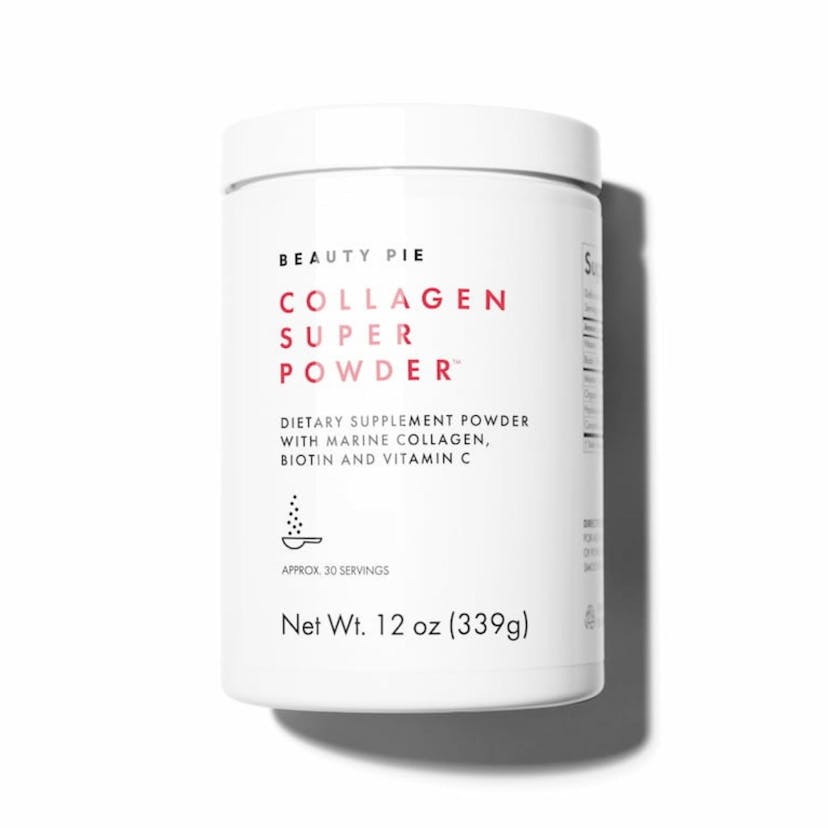
This light and refreshing daily supplement powder with hints of sweet berries is best taken with cold water or added to a cold smoothie or juice. It delivers Hydrolysed Marine Type I Collagen Peptides sourced from wild fish. This form is bioidentical to human collagen and researched with proven results.
Holland & Barrett Marine Collagen with Vitamin C 3000mg 180 Tablets, £24
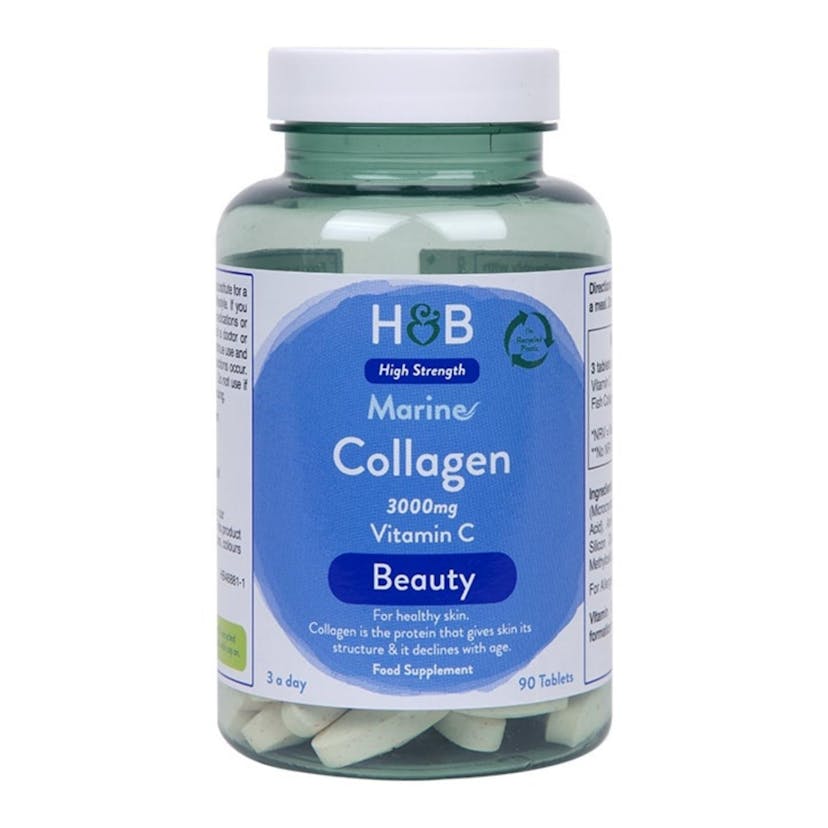
These collagen supplements also contain vitamin C, which contributes to normal collagen formation and keeps your skin healthy. It’s also suitable for pescatarians.
Collagen-rich diet
It’s always better to choose food over supplements no matter what. The same goes with collagen as per healthcare professionals like Eli Brecher, London-based Nutritionist and Founder of Eli Brecher Nutrition.
“I always take a food-first approach when working with clients to improve their skin issues. I advise my clients to prioritise consuming food that boosts collagen production, such as vitamin C and antioxidants. In addition, consume food high in protein, such as chicken, fish, eggs, beans, nuts, lentils, and tofu, to ensure you’re getting all the amino acids (the building blocks of protein) which are critical for collagen synthesis,” she says.
What’s the best thing you can do to boost your collagen?
“In order for the body to make collagen, it requires vitamin C. The human body cannot make vitamin C, so it must be consumed in our diets. I recommend focusing on consuming vitamin C-rich foods, such as strawberries, kiwi, broccoli, red pepper, and citrus fruits such as oranges, grapefruit, lemons, and limes. Vitamin C is an antioxidant, meaning it helps reduce oxidative damage and protects the skin from harmful free radicals,” explains Brecher.
Collagen-rich foods to include in your diet
“Oily fish, such as salmon, mackerel and sardines, are a major source of essential omega-3 fatty acids and possess antioxidant properties, both of which help protect against damaging free radicals and prevent collagen degradation. Other sources of antioxidants include green tea, dark chocolate, berries, beetroot and leafy greens like kale and spinach,” says Brecher.
Teriyaki and Honey Glazed Wild Alaska Salmon Recipe
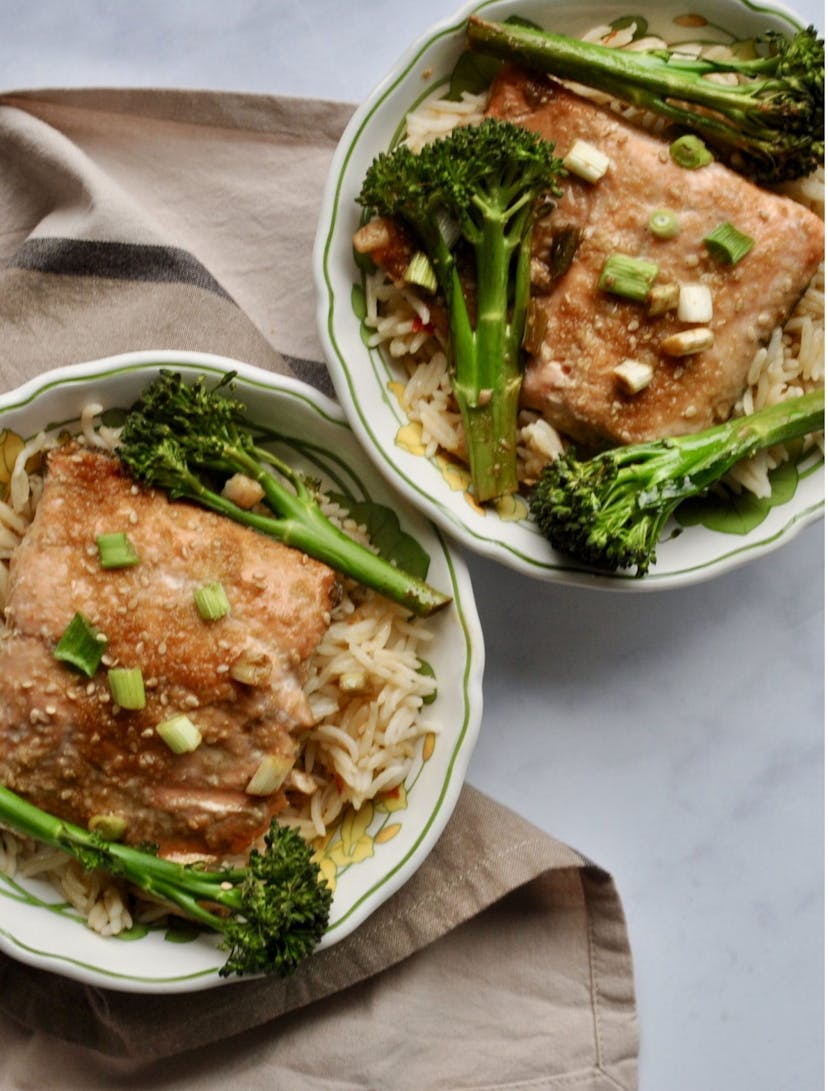
Nutritionist Eli Brecher shared her collagen-rich Teriyaki & Honey Glazed Wild Alaska Salmon Recipe which you can easily prepare at home.
Ingredients:
- 2 fillets of wild salmon (if frozen, defrost to fridge temperature or room temperature)
- 1 spring onion, chopped
- ¼ cup vegetable of choice (I used tenderstem broccoli, but you could use asparagus, carrots, mushrooms etc)
- 1 tbsp sesame seeds
For the Teriyaki Glaze:
- 3 tbsp soya sauce (or tamari if gluten-free)
- 1 tbsp rice wine vinegar
- 1 tbsp sesame oil
- 3 tbsp honey
- 2 cloves garlic (crushed)
- 1 inch piece fresh ginger (grated) or 1 tsp ground ginger
To serve:
- ¾ cup brown rice
- Juice of ½ lemon
- 1 tsp chilli flakes (optional)
Method:
- Line a large baking tray with greaseproof paper, tin foil or simply brush it with cooking oil of choice. In a small bowl or mug, stir together all sauce ingredients until well combined.
- Place salmon in a mixing bowl, pour over the sauce, cover, and leave to marinate for 20 – 30 minutes. Pre-heat the oven to 200 C.
- Transfer the salmon to the baking tray and place the vegetables on the tray. Pour the remaining marinade on top and sprinkle with chopped spring onions and sesame seeds. Bake for 13 – 15 minutes or until salmon flakes easily with a fork. A thicker piece of salmon may need another few minutes.
- Meanwhile, bring the rice to a boil, then add in the lemon juice and chilli flakes and simmer for 10 – 15 minutes.
- Serve salmon over the rice and enjoy hot or allow to cool then keep in the fridge for up to three days.
For more scrumptious and healthy recipes, follow Brecher’s blog at Eli Brecher Nutrition
Read next: Why You Need To Eat More Fibre: Simple Hacks To Up Your Intake At Home By A Doctor
Sign up for our newsletter
We will keep you in the loop for special offers, exclusive gifts and product news.

